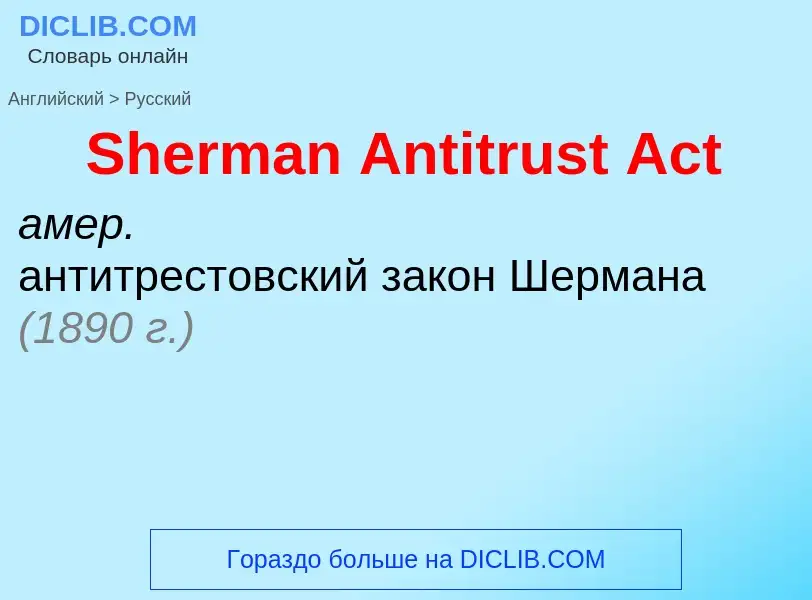Перевод и анализ слов искусственным интеллектом ChatGPT
На этой странице Вы можете получить подробный анализ слова или словосочетания, произведенный с помощью лучшей на сегодняшний день технологии искусственного интеллекта:
- как употребляется слово
- частота употребления
- используется оно чаще в устной или письменной речи
- варианты перевода слова
- примеры употребления (несколько фраз с переводом)
- этимология
Sherman Antitrust Act - перевод на русский
антитрестовский закон Шермана (1890 г.)
закон Клейтона (один из основных антитрестовских законов, 1914 г.)
прилагательное
общая лексика
вводящий, постановляющий
- Act to Regulate Commerce
- Agricultural Marketing Act
- Air Quality Act
- Bank Deposit Insurance Act
- Births and Deaths Registration Act
- Bretton Woods Agreement Act
- Budget and Accounting Act
- Capper-Volstead Act
- Census Act
- Clayton Act
- Clean Air Act
- Coastal Zone Management Act of 1972
- Consumer Product Safety Act
- Cooperative Marketing Act
- Counter Inflation Act of 1973
- Currency Act of 1900
- Depositary Institutions Deregulation and Monetary Control Act
- Deposit Insurance Act
- Economic Recovery Tax Act
- Edge Act
- Emergency Banking Relief Act
- Emergency Price Control Act
- Employee Retirement Income Security Act
- Employer's Liability Act
- Employment Act
- Employment Protection Act
- Export Administration Act
- Export Expansion Act
- Fair Labor Standard Act
- Fair Reporting Credit Act
- Fair Trading Act
- Farm Credit Act
- Federal Insurance Contributions Act
- Federal Land Policy and Management Act
- Federal Property and Administrative Services Act
- Federal Reserve Act
- Federal Water Pollution Control Act
- Finance Act
- Financial Services Act
- Full Employment and Balanced Growth Act
- Glass-Steagall Act
- Gold Reserve Act
- Gold Standard Act
- Health and Safety at Work Act
- Home Loan Bank Act
- Humphrey-Hawkins Act
- Insect Pest Act
- Interstate Commerce Act
- Investment Companies Act
- Labor Management Relations Act
- Lend-Lease Act
- Local Employment Act
- Mineral Leasing Act
- Mining and Mineral Policy Act
- National Bancruptcy Act
- National Bank Act
- National Environmental Policy Act
- National Industrial Recovery Act
- Occupational Safety and Health Act
- Plant Quarantine Act
- Portal-to-Portal Act
- Public Utility Holding Company Act
- Reclamation Act
- Redundancy Payments Act
- Registration Service Act
- Resource Conservation and Recovery Act
- Resources Recovery Act
- Rivers Act
- Robinson-Patman Act
- Sale of Goods Act
- Securities Act
- Securities Exchange Act
- Securities Investor Protection Act
- Sherman Antitrust Act
- Shops Act
- Silver Purchase Act
- Smith-Lever Act
- Solid Waste Disposal Act
- Surface Mining Control and Reclamation Act
- Taft-Hartley Act
- Trade Agreement Act
- Trade Description Act
- Trade Disputes Act
- Trade Facilities Act
- Water Quality Act
2) акт, документ
3) событие; действие; мероприятие
4) действовать; выполнять функции
- act as
- act for
- act of protest
- act of purchase
- act of sale
- antitrust acts
- copyright act
- derived act
- designs act
- factory acts
- fair-labor-relations acts
- fair-trade acts
- restrictive trade practicies acts
- shipping act
- trademarks act
- zoning act
общая лексика
Annual Change Traffic
годовая динамика изменений, изменение (программы) в течение года
доля исходного кода программного продукта, которая изменилась за год вследствие дополнения или модификации
позволяет оценить расходы на сопровождение
сокращение
advance corporation tax
[automatic custody transfer] автоматическая откачка нефти с промысла потребителю по закрытой системе (с регистрацией объёма, плотности, температуры, содержания донных осадков и воды)
Смотрите также
Определение
Википедия
The Sherman Antitrust Act of 1890 (26 Stat. 209, 15 U.S.C. §§ 1–7) is a United States antitrust law which prescribes the rule of free competition among those engaged in commerce. It was passed by Congress and is named for Senator John Sherman, its principal author.
The Sherman Act broadly prohibits 1) anticompetitive agreements and 2) unilateral conduct that monopolizes or attempts to monopolize the relevant market. The Act authorizes the Department of Justice to bring suits to enjoin (i.e. prohibit) conduct violating the Act, and additionally authorizes private parties injured by conduct violating the Act to bring suits for treble damages (i.e. three times as much money in damages as the violation cost them). Over time, the federal courts have developed a body of law under the Sherman Act making certain types of anticompetitive conduct per se illegal, and subjecting other types of conduct to case-by-case analysis regarding whether the conduct unreasonably restrains trade.
The law attempts to prevent the artificial raising of prices by restriction of trade or supply. "Innocent monopoly", or monopoly achieved solely by merit, is legal, but acts by a monopolist to artificially preserve that status, or nefarious dealings to create a monopoly, are not. The purpose of the Sherman Act is not to protect competitors from harm from legitimately successful businesses, nor to prevent businesses from gaining honest profits from consumers, but rather to preserve a competitive marketplace to protect consumers from abuses.

![Ohio]]), the principal author of the Sherman Antitrust Act Ohio]]), the principal author of the Sherman Antitrust Act](https://commons.wikimedia.org/wiki/Special:FilePath/John-Sherman-2.jpg?width=200)
